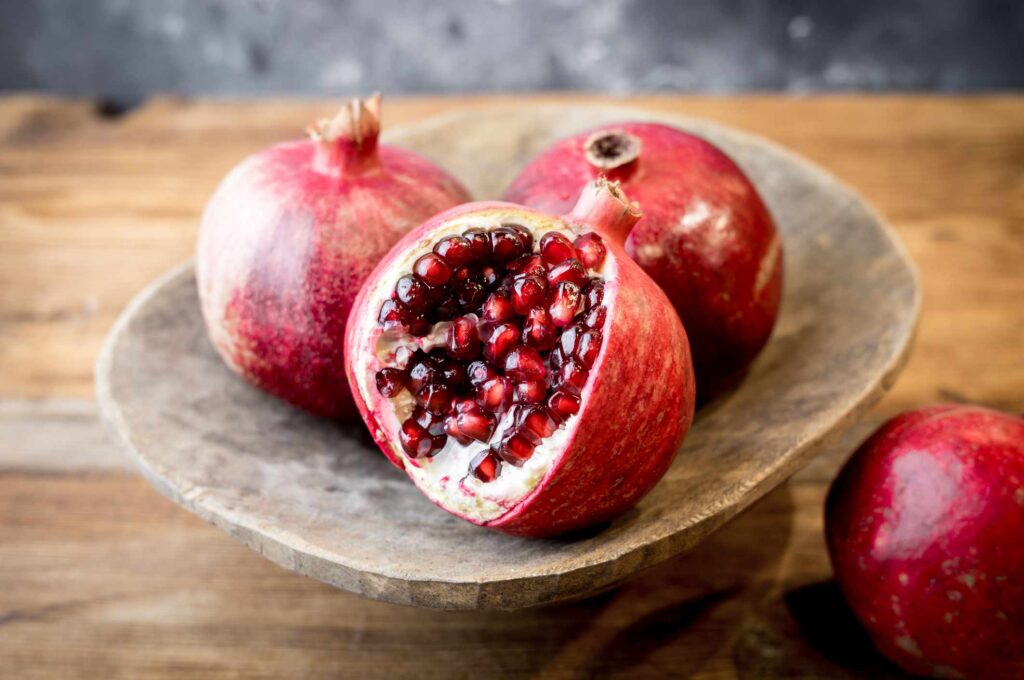Punica granatum

Pomegranate has spread to most parts of the world, including Asia, the Middle East, and the Mediterranean countries. Pomegranate contains a large percentage of water and is rich in vitamin C and polyphenols.
Pomegranate has been used for generations in treating ulcers, diarrhoea, and infertility. Pomegranate seeds contain phytoestrogens (compounds that possess estrogenic activity) like genistein, daidzein, glutamic amino acids, and aspartic acids (Battineni et al., 2017). The boiled, crushed skin of the pomegranate fruit is also touted as a remedy for indigestion and, by some accounts, heart ailments.
Nutrition
The nutritional properties of pomegranate have been studied in numerous studies, and it could be a good candidate for food additives and preservatives because of antioxidant and antimicrobial activity, having pectin and fiber. Moreover, waste materials (peels) would be a natural option for food packaging because of plasticizing, strengthening, and elongation activity besides its specific color. Pomegranate molasses, is a tangy, thick syrup used to add zest to salads and meats.
It’s a potent anti-inflammatory and antioxidant and can be applied topically, for instance, on the lips to combat cold sores and reduce inflammation. The molasses, a concentrated form of pomegranate juice, aids those with kidney stones and is believed to help break down fats. It’s a common dressing and stew ingredient, especially in Iraq.
Therapeutic Effects
Pomegranate has been used in traditional medicine for the treatment of diarrhea, dysentery, hemorrhoids, intestinal parasites, sore throat, diabetes, epistaxis, and vaginal itching and is believed to be tonic for the heart.
Research has shown that pomegranate possesses myriads of pharmacological activities such as anti-diabetic, anti-obesity, cardioprotective, anti-tumor, anti-inflammatory, anti-malaria, anti-fibrotic, anti-fungal, anti-bacterial, and other effects. Samira Eghbali 2021
Increasing evidence has shown that P. granatum and its active compounds are promising in the amelioration, prevention, and treatment of cancer, virus, inflammation, obesity, diabetes, malaria, liver fibrosis, fungal infections, and bacterial infections. Nhlanhla Maphetuiepje 2022
Diabetes
Several human studies have evaluated the antidiabetic effects of pomegranate. The effect of pomegranate juice in diabetic patients in reducing fasting blood glucose may be associated with punicic acid, methanolic seed, and pomegranate peel extracts.
Fresh pomegranate juice consumption (1.5 ml/kg) in 85 diabetic patients revealed significant reduction in fasting blood sugar and insulin resistance and increased β-cell function (p < 0.05). This hypoglycemic effect was correlated with baseline FBG levels, as patients with lower FBG levels showed better hypoglycemic response. Banihani S et al, 2014
Cardiovascular & Coronary Heart Disease
..
Metabolic Syndrome
..
Covid 19
Currently, the COVID-19 pandemic is considered a global public health concern. There is no particular therapy against COVID-19. Several clinical and preclinical studies are currently performed to investigate a gold-standard therapy with high possible efficacy and low adverse effect [19, 20].
Pomegranate is recognized as the primary source of principal ingredients, including flavonoids, magnesium, potassium, and iron. It also has antioxidant components, alpha-linolenic acid (omega 3), linoleic acid (omega 6), and oleic acid (omega 9) [21]. In vitro, the aqueous extract of pomegranate peels showed inhibition of COVID-19 virus replication [22]. It seems that consumption of pomegranate juice (PJ) can be applied for prophylactic and therapeutic approaches against COVID-19 [21].
At present, one RCT is aiming to evaluate the efficacy of PJ on inflammatory parameters, C-reactive protein (CRP), interleukin 6 (IL-6), erythrocyte sedimentation rate (ESR), and complete blood count (CBC) in mild to moderate COVID-19 patients (IRCT20150711023153N2) [23]. Further clinical studies must be performed to evaluate the effect of pomegranate in the current COVID-9 pandemic. In the present study, we investigated the clinical application of pomegranate in the treatment and prevention of different diseases. Samira Eghbali 2021
Wound Healing
The polyphenols from peels of were shown to increase fibroblast infiltration, collagen regeneration, vascularization, and epithelialization in the wound area of diabetic rats. This has been related to increasing hydroxyproline, nitric oxide production, and activity as well as elevation of transformin growth factor–β1, vascular endothelial growth factor, and epidermal growth factor in wound tissues. Its peel and fruit extract have shown anti-inflammatory effect by inhibiting the expression of pro-inflammatory proteins. The tannin-rich fractions, ellagitannins, phenolic acids are effective against Staphylococcus spp.
Infertility
Regulating Female Hormonal Balance An animal study on rats with PCOS shows that pomegranate extract due to the presence of phytoestrogens can regulate and reduce PCOS symptoms. In a randomized controlled triple-blind parallel trial study on 23 women with PCOS, it was found that pomegranate fruit extract improved the serum levels of sex hormones (testosterone reduction) and their lipid profile (Esmaeilinezhad et al., 2019). A study on PCOS-induced rats, pomegranate fruit extract was found to increase serum estrogen levels and reduce symptoms after 81 days (Hossein et al., 2015).
Effect on Endometrium The extract of the plant increases mucus secretion by increasing uterine blood flow and also increases the thickness of the uterine wall. This increase in mucosal secretions through anti-inflammatory mechanisms enhance the implantation rate (Hossein et al., 2015; Promprom et al., 2010).
Sexual Satisfaction Pomegranate peel contains calcium and tannins, which Mohammadzadeh et al. (2019) in a triple-blind randomized controlled clinical trial on 110 normal women showed increase of sexual satisfaction of women after using them as a gel, and also reduction of inflammatory and infectious symptoms in their reproductive canal.
Male Infertility Pomegranate possessed strong antiaging activity by alleviating aging-induced male infertility through reestablishing the hormonal balance and testis architecture in rats. (Alshinnawy et al, 2022) Daily consumption of Pomegranate juice for seven weeks increased sperm concentration and motility and decreased abnormal sperm rate in male rats. (Turk et al, 2008)

Doses & Preparations
..
Precautions for Use
Pomegranate is known to lower blood pressure so people known to have low blood pressure as well as those on blood pressure medication should be careful. Some medications are changed and broken down by the body. Pomegranate might decrease how quickly the body breaks down these medications. Taking pomegranate along with these medications can increase their effects and also their side effects. Examples are Carbamazepine, Amitriptyline, Codeine, Tramadol and Warfarin. Rxlist-Pomegranate